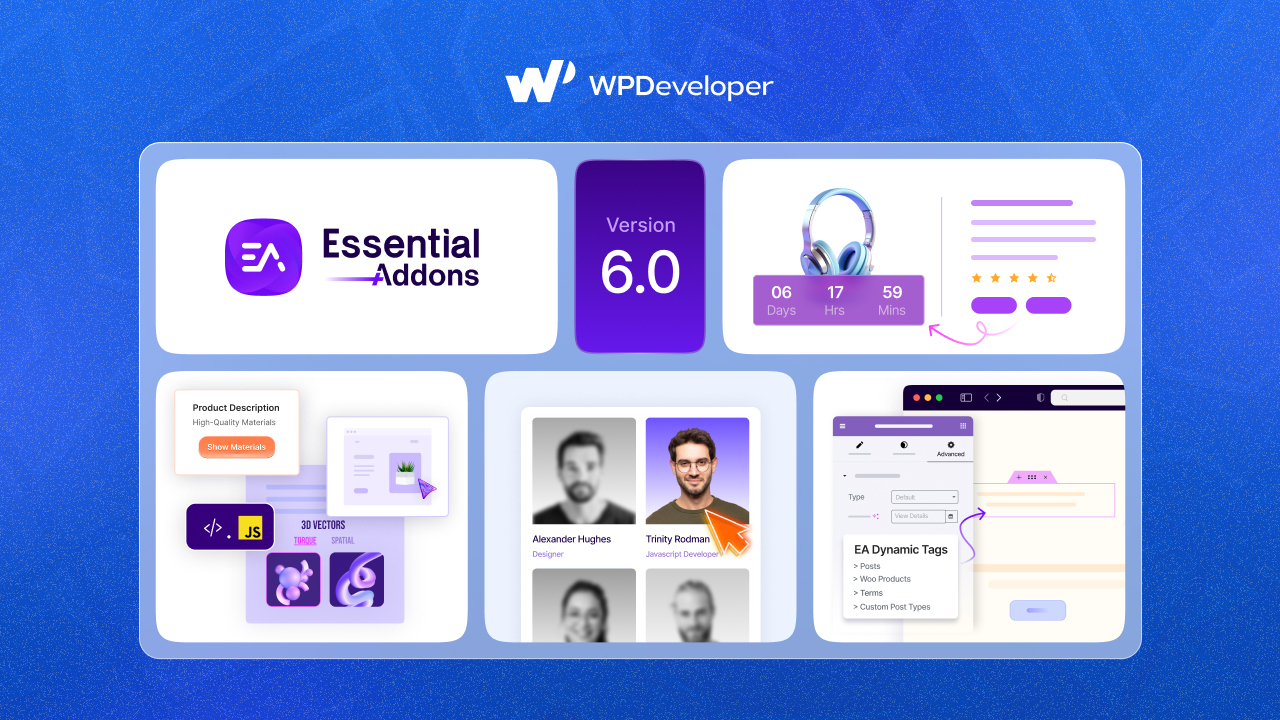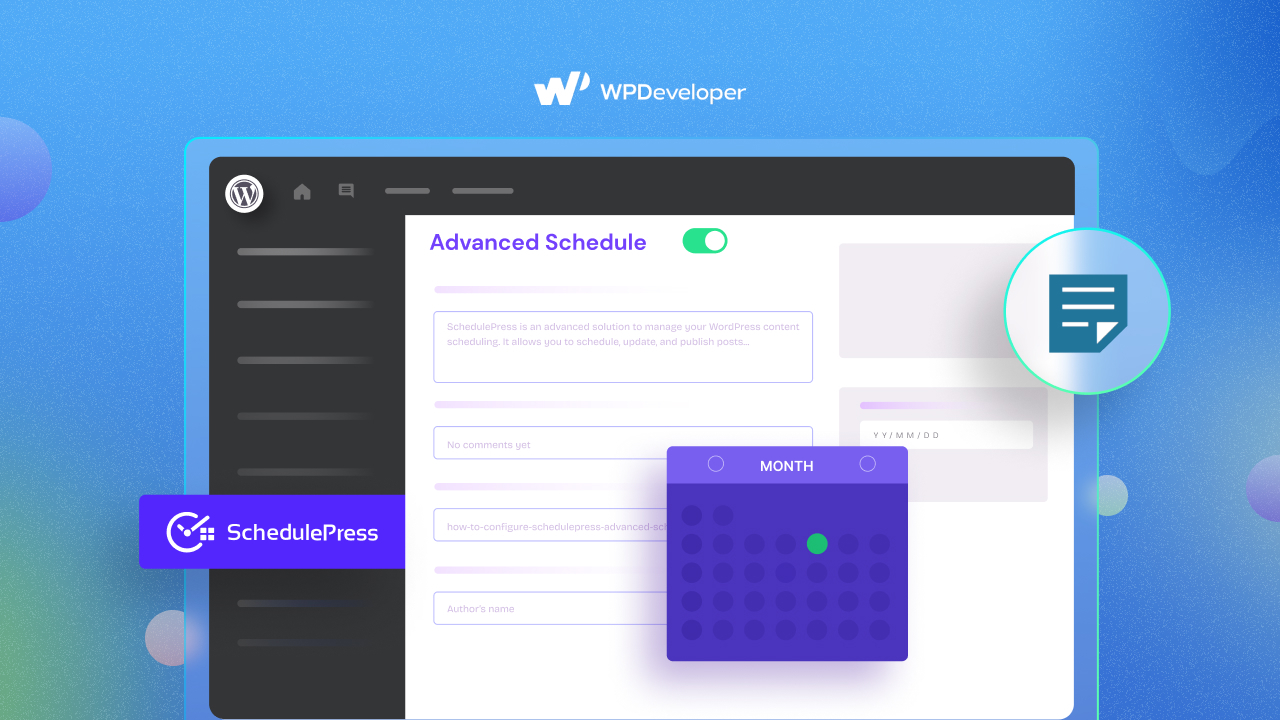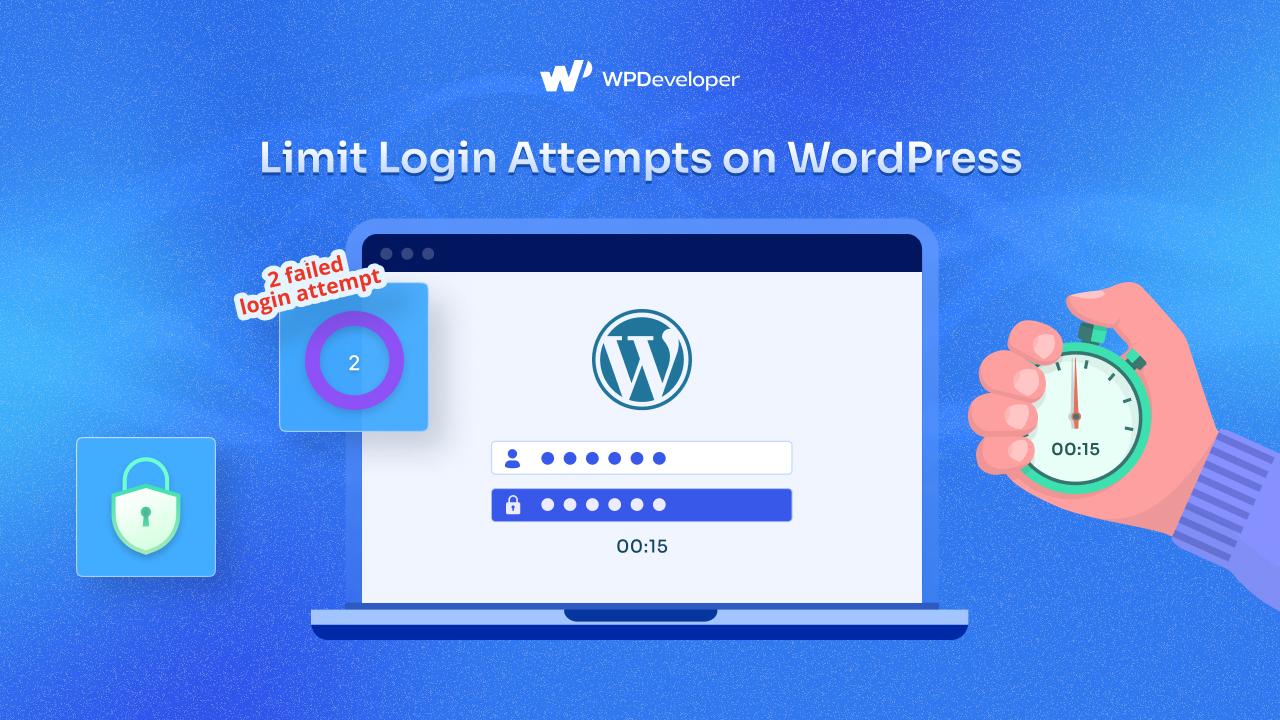Looking for a profitable opportunity in the digital world? The global web hosting business industry is booming, projected to exceed $355 billion by 2028 according to Statista. With the growing need for reliable hosting services, now is the perfect time to tap into this thriving market and start your own hosting business.
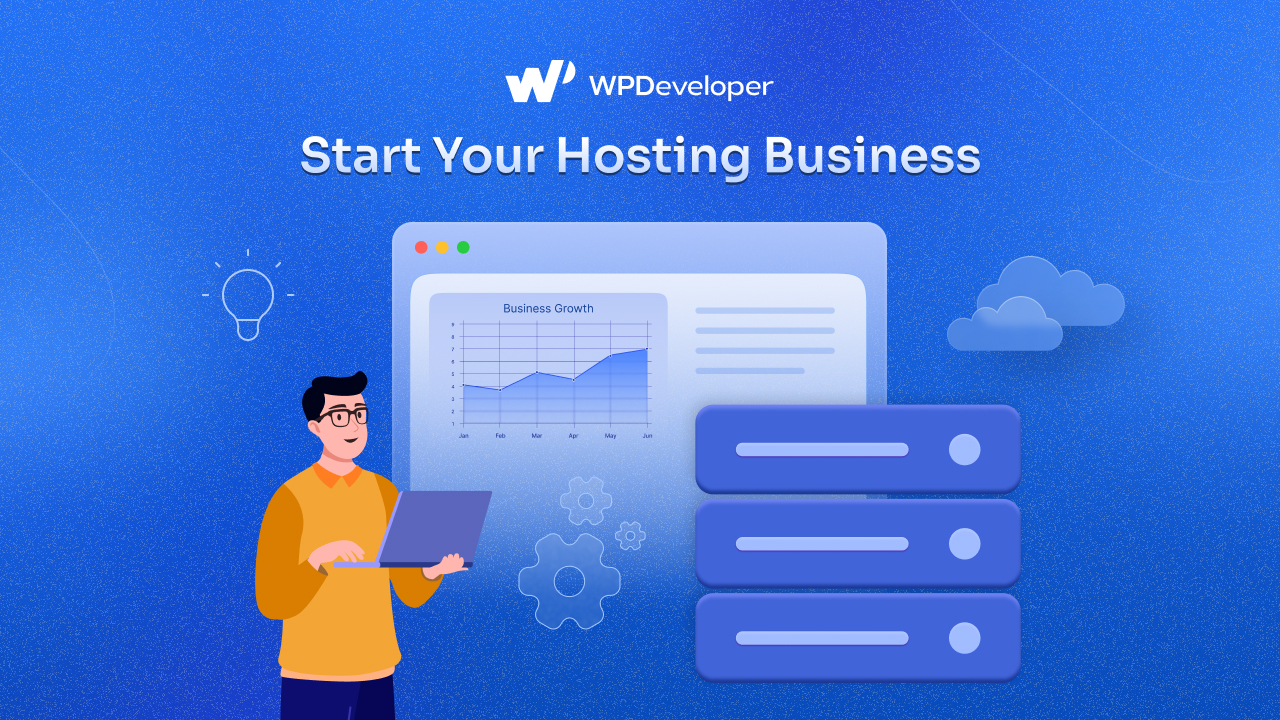
Launching a hosting company is simpler and more affordable than you might think. Whether through reseller as commission based or white-label hosting with self branding, this business model offers recurring income, strong client relationships and long-term growth. Follow this guide through every step to start your hosting business easily. From choosing the right model to attracting customers to build a successful hosting company.
Why Start a Hosting Business?
Starting a hosting business is one of the smartest moves you can make in today’s digital-first world. Think about it, every business, entrepreneur, or creative project needs a website and behind every website is a hosting provider making it all work. Stepping into the role of a hosting provider places you in a high-demand, high-potential market where businesses depend on your services to maintain their online presence seamlessly.
📈 A Growing Market with Stable Revenue
The hosting industry is not just growing. It is thriving. From eCommerce websites to personal blogs, the number of websites being created daily is staggering. And here is the best part, hosting services are subscription-based. This means you can earn steady, recurring income every month by providing reliable services to your clients. Unlike many businesses, where you need to sell to new customers constantly, hosting gives you the advantage of building long-term relationships with your clients.
🧱 Low Barrier to Entry
You do not need to build a massive data center or have a tech background to start. Options like reseller hosting or white-label hosting make it incredibly easy for beginners. Essentially, you rent server space from a larger provider and sell it under your brand name. You focus on marketing and customer service, while the technical aspects are managed by the provider.
🔄 Flexibility And Scalability
Another big win? Hosting businesses are flexible. You can start small, targeting a specific niche like freelancers or local businesses and scale as you grow. As your customer base expands, you can invest in more resources or offer additional services like domain registration, email hosting, or website management.
🚦 Why Now Is the Right Time
With the rise of online businesses, remote work and digital transformation, more people are relying on websites than ever before. Businesses want a trusted partner to manage their hosting needs and that is where you come in.
Starting a hosting business is not just about offering a service. It is about building a business with recurring income, strong customer relationships and unlimited growth potential.
Types of Hosting Business Models
When starting a hosting business, choosing the right business model is key to your success. There are several options to consider, each with its own benefits and challenges. Let’s break down the most popular models:
1. Reseller Hosting
Reseller hosting allows you to buy server space from an established hosting provider and resell it to your own customers. This is ideal for beginners because you do not need to manage the technical side of things.
Starting a reseller hosting business offers benefits like low startup costs and no need to manage hardware, making it easy to begin. It’s also scalable, growing with your customer base. However, there are downsides, such as limited control over technical issues and profit margins tied to the provider, which can affect earnings.
2. White Label Hosting
White-label hosting is essentially reseller hosting but with your own branding. You offer hosting services under your own name, making it look like you own the entire hosting operation. This gives your business a more professional appearance.
White label hosting gives you full control over branding and customer experience, offering more flexibility in pricing and services, which leads to higher profit potential. However, you’ll still rely on the hosting provider for server maintenance, and strong marketing skills are necessary to build and promote your brand effectively.
3. Cloud Hosting
Cloud hosting offers flexible, scalable resources hosted across multiple servers. Great for websites with fluctuating traffic. This business is scalable, flexible, and offers reliable uptime, but it comes with a more complex setup and management process.
4. Dedicated Hosting
With dedicated hosting, you lease an entire server for your clients, offering full control over resources. This model is suited for businesses that need high-performance hosting. It gives you full control over server settings and being ideal for high-traffic sites, this hosting option offers great benefits. However, it comes with higher costs and requires more technical knowledge to manage effectively.
5. Managed Hosting
Managed hosting takes care of all server management for you, leaving you to focus on your business. This hosting model offers less technical responsibility but can be expensive; choose between reseller or white-label hosting.
Step-by-Step Guide: How to Start Your Hosting Business Easily
To start your hosting business, White Label hosting is ideal to get into the profit business on your own terms without building it from scratch. Here we are using xCloud’s White Label Hosting solution to effortlessly start a web hosting business with your own brand.
xCloud allows you to focus on building your business while they handle the technical complexities. Setting up your xCloud White Label reseller account is easy and straightforward. Just follow these steps to launch your own hosting business and start selling under your brand.
Step 1: Log in to the xCloud White Label Dashboard
Start by logging into your xCloud account, navigating to the ‘White Label’ tab, agreeing to the terms of service, and clicking ‘Start Your Hosting Business Now’ to begin the setup process.
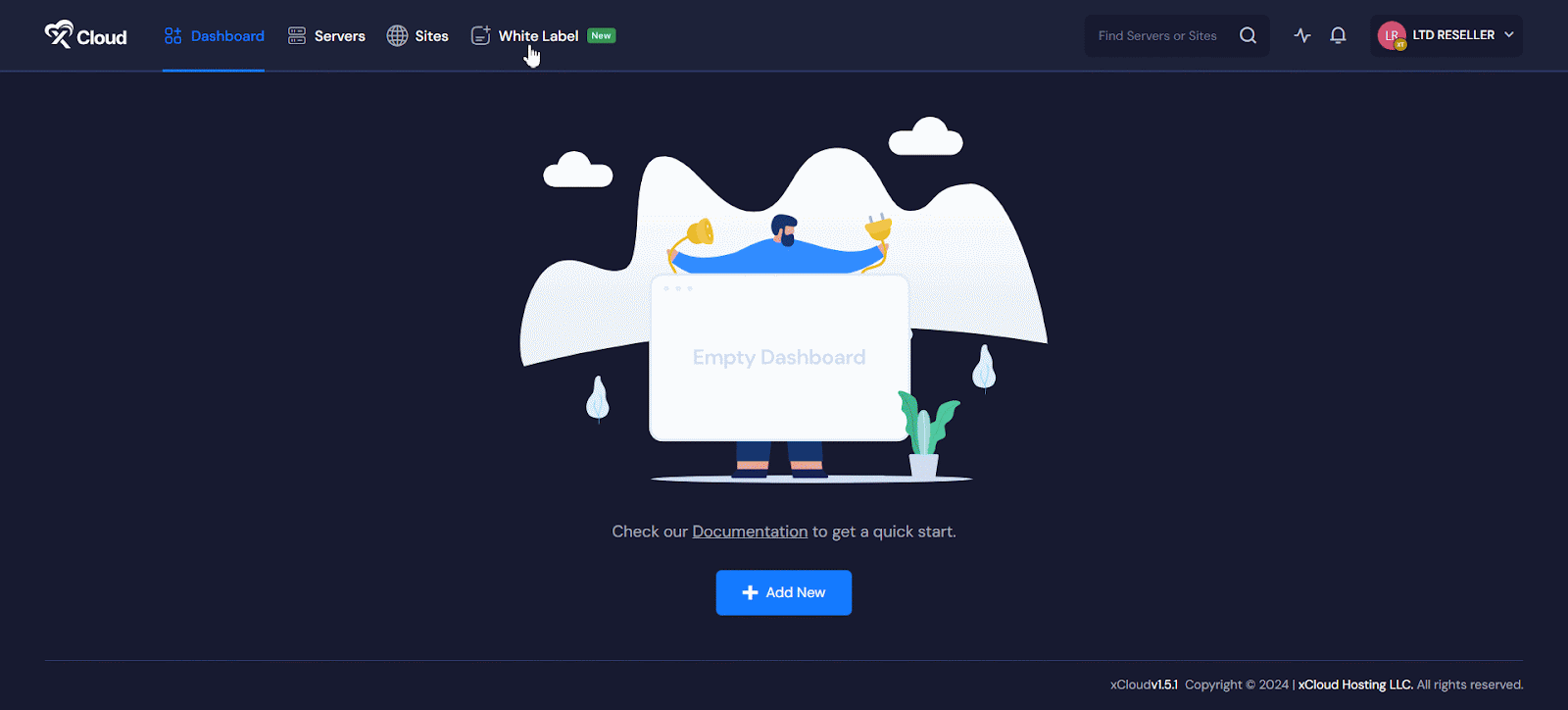
Step 2: Set Up Your Brand And Payment Method
Next, add your brand details by uploading your logo using the ‘Upload Logo’ button, then enter your business name, mailing address, and contact number. Once done, click ‘Next’ to save and proceed.
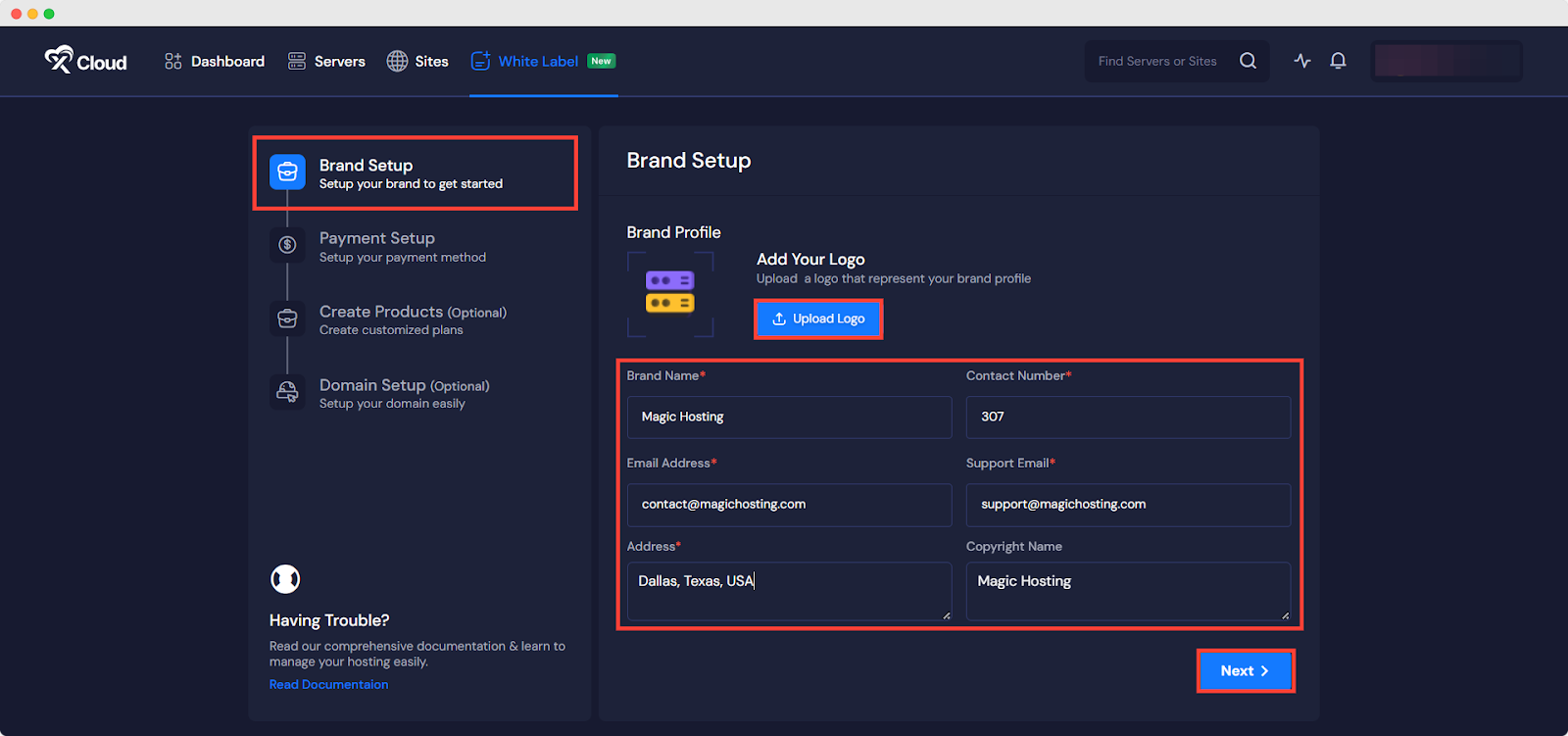
Next, integrate Stripe for payment processing. If you already have a Stripe account, click ‘Connect Now,’ log in to the Stripe Connect dashboard, and complete the setup.
Note: A Stripe account is required for billing, so ensure you set this up before proceeding.
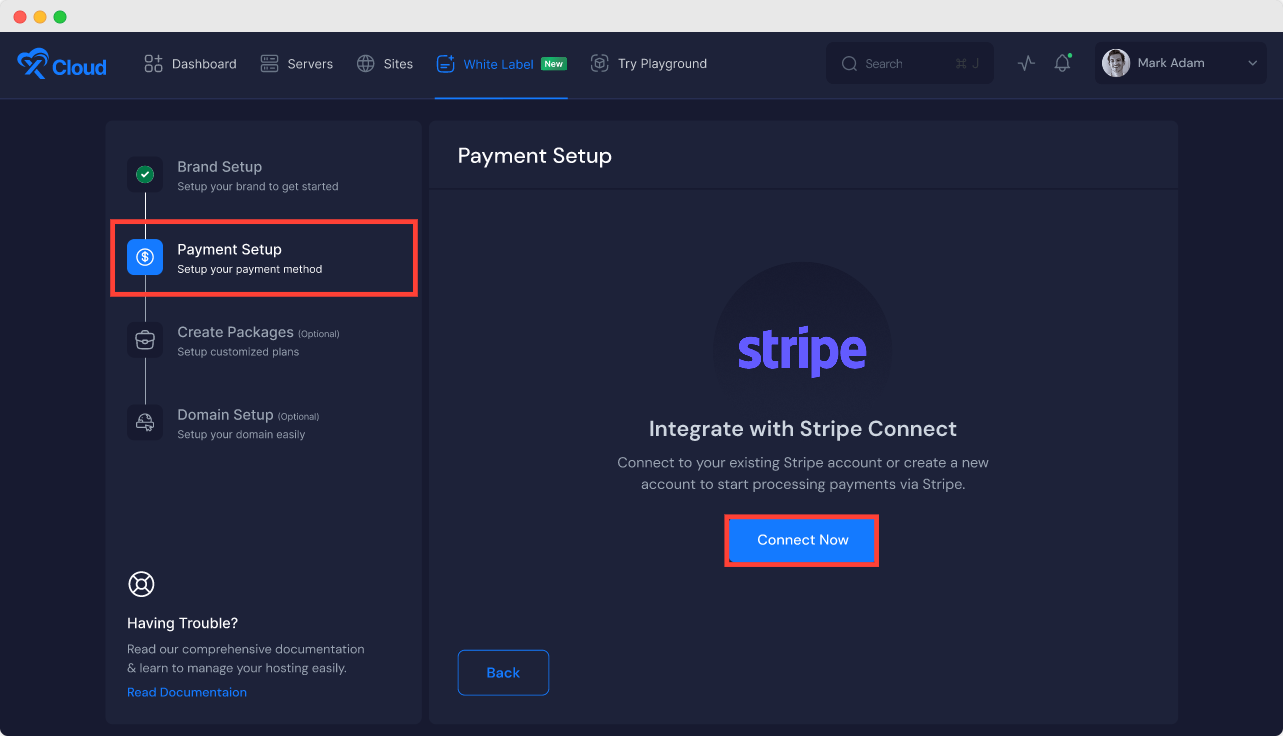
Step 3: Create Custom Hosting Packages And Set Up Your Domain
Now, it is time to create your custom hosting packages. Click the ‘Create Hosting Plan’ button, which will open a pop-up with different server configurations. Choose either the ‘General’ or ‘Premium’ options, select your desired server size and review the pricing. Once you are happy with the setup, click ‘Next’ to proceed.
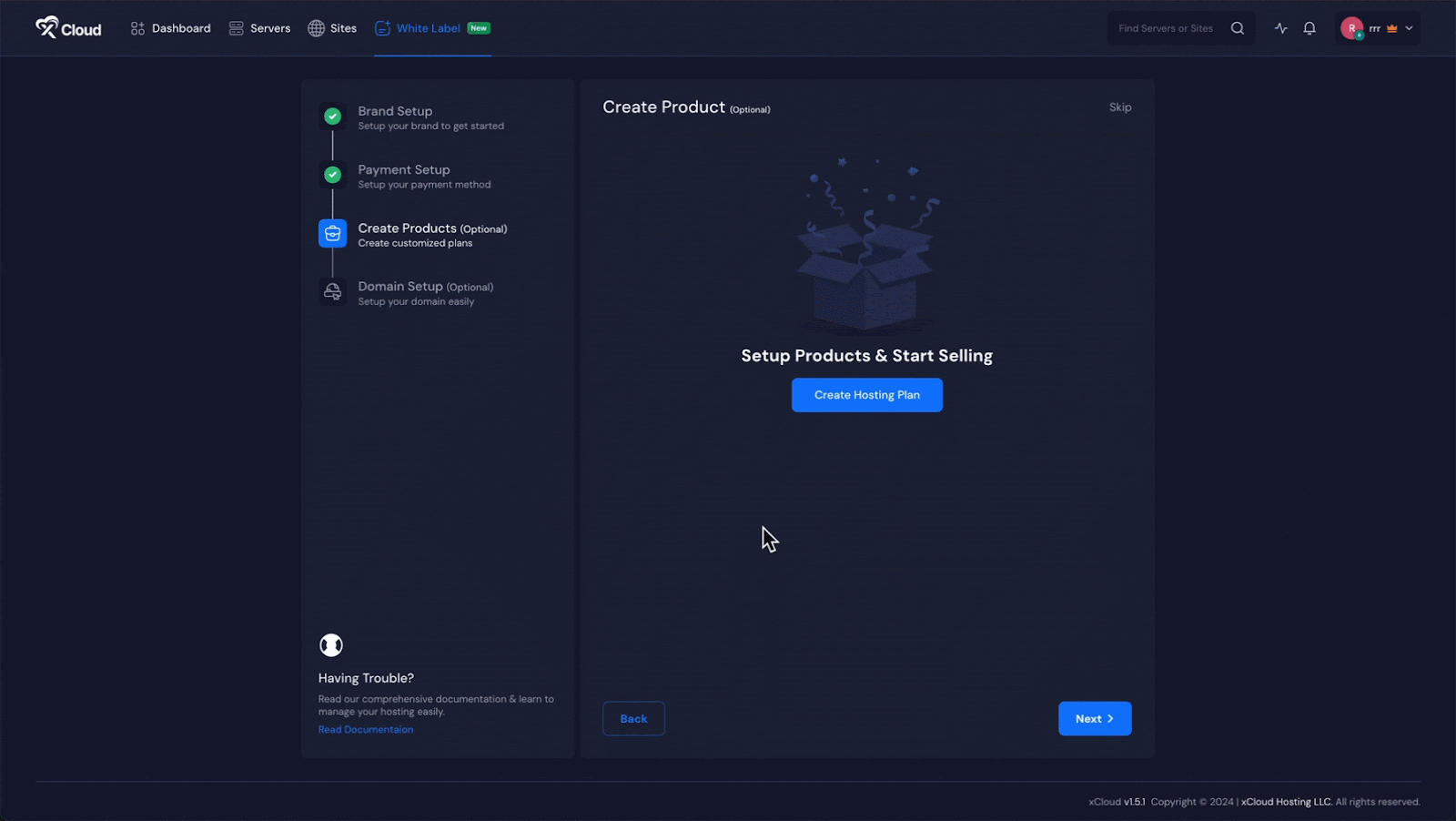
Enter a unique name for your plan in the ‘Plan Name’ field, set your monthly price in the ‘Custom Price/Month,’ specify the ‘Site Limit,’ and add a ‘SKU.’ Fill in any other necessary details and apply a coupon code if applicable. Once finished, click ‘Save’ to store the plan or ‘Save and Publish’ to make it immediately available.
Note: Make sure to set a price for your custom plan that is higher than the server cost to ensure you generate a profit.
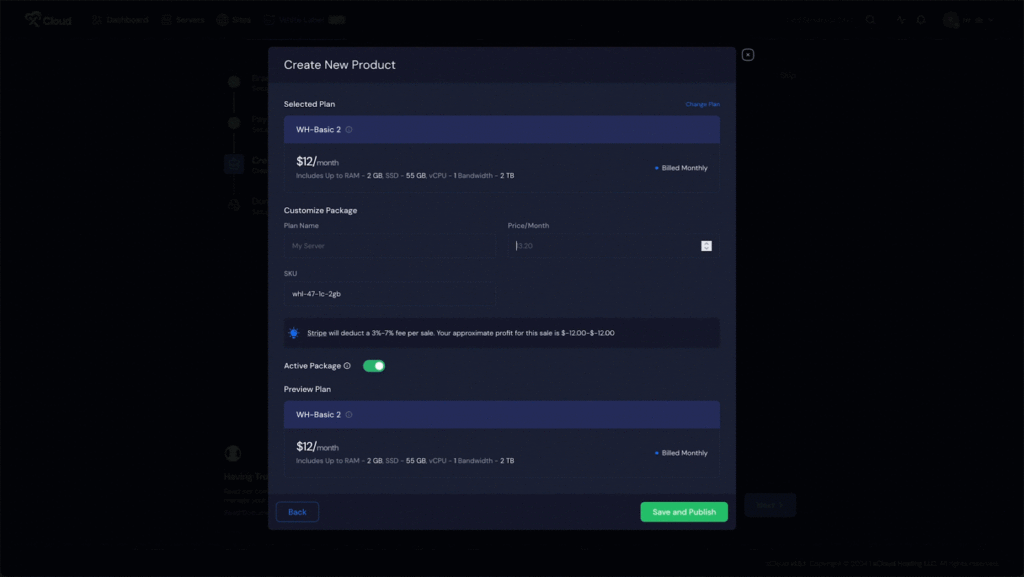
To finalize the setup, link your domain by entering it in the ‘Add Your Domain Name’ field. Then, update your DNS settings with your domain provider to point to xCloud. Once the DNS verification is complete, return to your xCloud dashboard and click ‘Next’ to finish.
Note: If your domain is not ready yet, xCloud provides a temporary URL that you can update later to your own domain.
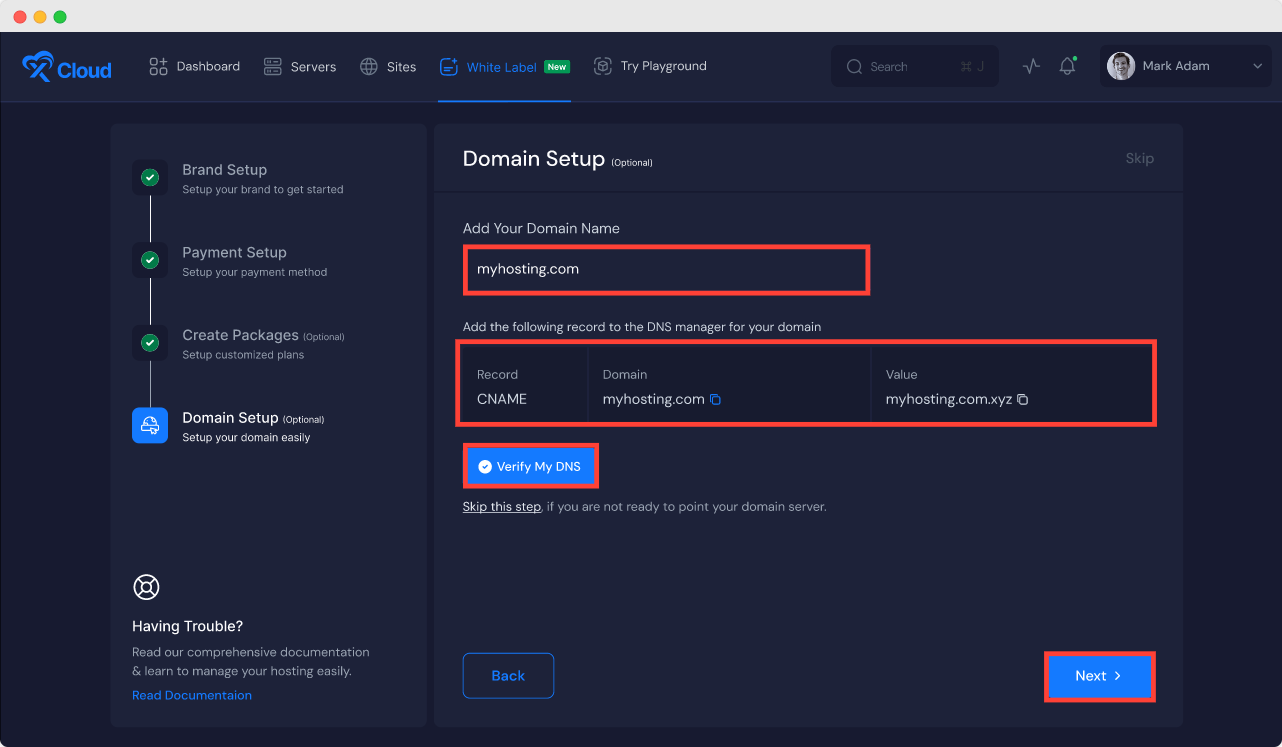
Once the setup is complete, your dashboard will showcase all the essentials. From here, you can effortlessly monitor servers, manage client sites, review billing details and handle everything efficiently from a centralized location.
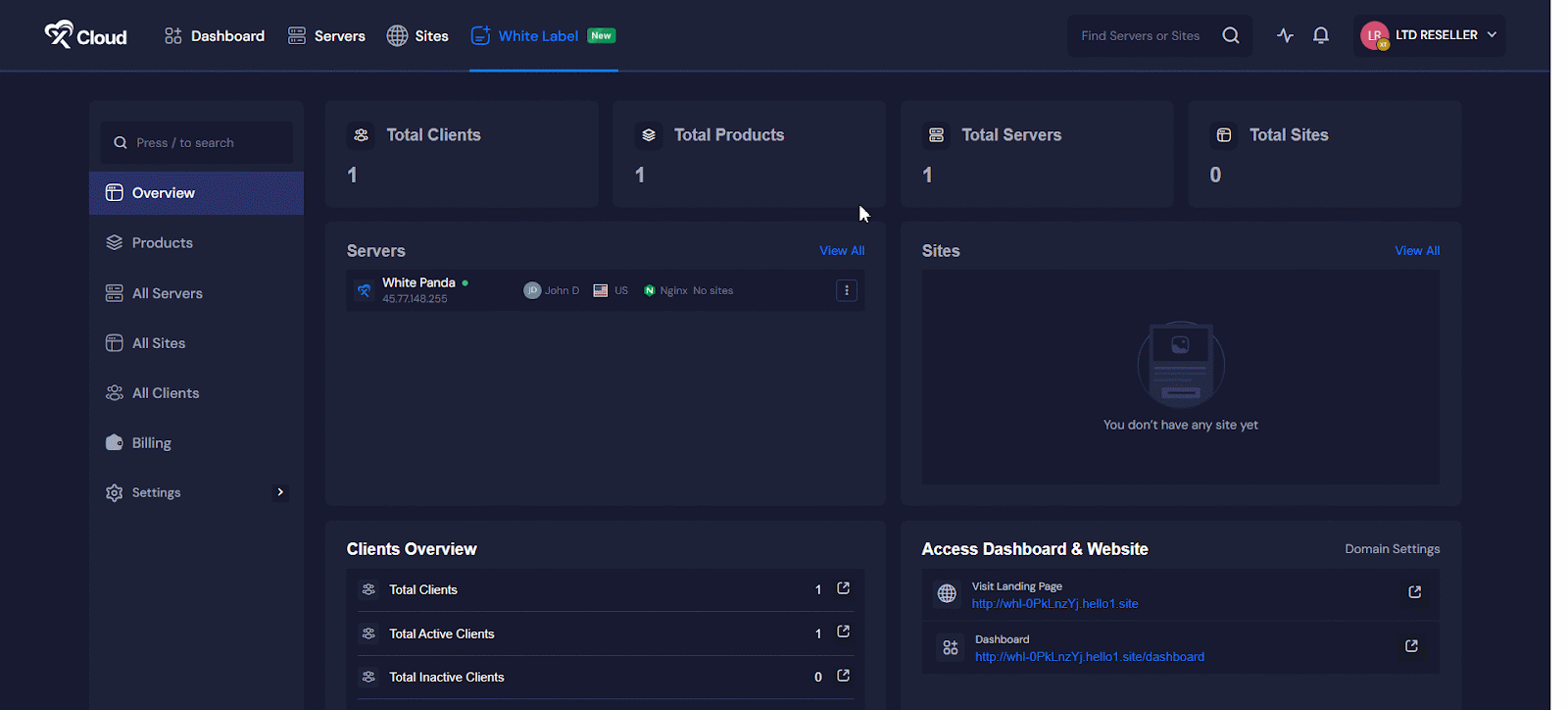
This is how your reseller account setup with xCloud White Label is complete. You are now ready to start selling hosting services under your own brand with fully customized packages.
Common Mistakes to Avoid When Starting a Hosting Business
Starting a hosting business is exciting, but it comes with its fair share of challenges. As someone who has been in the industry for years, I have seen many beginners make the same mistakes. Here is how you can avoid them:
1. Neglecting Market Research
One of the biggest mistakes is diving into the hosting business without understanding your target market. Not all hosting services are the same and it is crucial to know what your potential clients need. For example, a local business might need affordable shared hosting, while a growing eCommerce site could require robust cloud hosting. Spending time understanding your market before you start this will guide your offerings and pricing.
2. Choosing the Wrong Hosting Provider
Choosing the wrong hosting provider can cause major issues down the line. A provider with poor uptime or lackluster customer support can hurt your reputation. Opt for a provider with a good track record and reliable support. It is worth investing time to research and choose a provider that aligns with your business needs.
3. Overcomplicating Pricing Structures
It is tempting to create complex pricing plans to appeal to a wide range of customers, but this can confuse potential clients. Keep your pricing simple, clear and competitive. A straightforward, transparent pricing model makes it easier for customers to make decisions and can help build trust.
4. Ignoring the Importance of Customer Service
Your hosting business is only as good as the support you provide. Many beginners focus too much on the technical side and neglect customer service. Offering support through multiple channels like chat, phone, or email can set you apart from competitors.
5. Underestimating Marketing Efforts
Even the best hosting services would not t succeed if no one knows about them. Many new hosting businesses underestimate the importance of marketing. Invest in SEO, social media and paid ads to drive traffic to your site. The more visibility you have, the better your chances of attracting customers.
Avoiding these mistakes can help you build a stronger, more successful hosting business. Stay focused, do your research, and always keep your customers at the heart of your business.
Tips for Scaling Your Hosting Business
As your hosting business grows, it’s important to scale it strategically. Here are some advanced tips to help you grow sustainably and maximize your potential:
1. Useful Customer Support
As your customer base expands, providing support can become overwhelming. Increase customer service with dedicated representatives, knowledge bases and ticketing systems. This will allow you to handle common inquiries quickly and efficiently, while still offering personalized support when needed.
- Set up AI-powered chatbots for instant responses.
- Build a comprehensive FAQ and help center.
- Implement a ticketing system for organized follow-ups.
2. Upsell Premium Features
Offer premium services like managed hosting or additional storage to your existing customers. Upselling is a great way to increase your revenue without constantly seeking new clients.
- Introduce managed hosting for clients who need more support.
- Offer higher-tier plans with better performance features.
- Provide website backups, enhanced security, and SSL certificates as add-ons.
3. Expand into New Niches or Regions
If you have had success with a specific type of hosting, consider branching out. For example, you could target different industries or expand into new geographic regions. This opens up new markets and growth opportunities.
- Research and understand the needs of new niches.
- Localize your website and services for different regions.
- Tailor marketing strategies to specific demographics.
4. Network with Other Entrepreneurs & Attend Industry Events
Building relationships with other entrepreneurs can lead to valuable partnerships and growth opportunities. Attend industry events and connect with influencers, experts, and potential clients.
- Join hosting-related online communities and forums.
- Attend hosting and tech conferences (even virtual ones).
- Collaborate with influencers to expand your brand’s reach.
Implementing these strategies allows you to scale your hosting business while ensuring smooth and efficient operations. Focus on automation, upselling and expanding strategically to ensure long-term success.
Unlock the Potential of the Booming Web Hosting Industry
Starting a hosting business is one of the most promising and profitable ventures you can pursue today. With the growing demand for online services, there’s never been a better time to get involved in the hosting industry.
Choosing the right business model, steering clear of common pitfalls and applying effective strategies will help you build a successful hosting company with recurring income and long-term growth potential.
Starting your own hosting business doesn’t have to be complicated or expensive. Whether you choose reseller hosting or white-label hosting, you can get started with minimal upfront investment and start offering reliable services to your clients right away.
If you have found this blog useful, subscribe to our blog for similar blogs like this one. And join our Facebook community to connect with WordPress enthusiasts like you.


